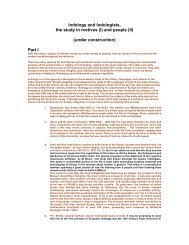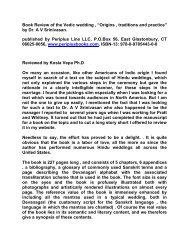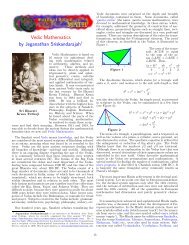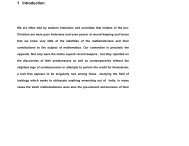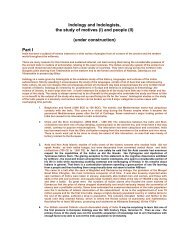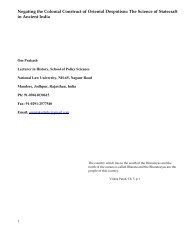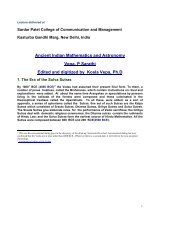The Dhaarmik Traditions - Indic Studies Foundation
The Dhaarmik Traditions - Indic Studies Foundation
The Dhaarmik Traditions - Indic Studies Foundation
You also want an ePaper? Increase the reach of your titles
YUMPU automatically turns print PDFs into web optimized ePapers that Google loves.
Freedom to choose an Ishta Devata( personal Deity) realizing such freedom could<br />
result in different choices of deities<br />
Belief in Free Will and its relationship to Karma( personal responsibility and<br />
accountability)<br />
Freedom to pursue PurushArtha or Chaturvarga (the four goals of life dharma,<br />
artha, kama and moksha) on the path to Self Realization<br />
Freeedom to choose the appropriate path (Karma Yoga, Jnana Yoga, Bhakti Yoga,<br />
Raja Yoga) or combination thereof toachieve Self Fulfillment depending on<br />
onesVasanas<br />
Observe the ethical responsibilities enjoined by the Dharma (Ethics, integrity and<br />
building of character)<br />
19. Do Hindus have a Chief among all Swamis, like a Pope,<br />
sort of a Parama Rishi if you will <br />
No. <strong>The</strong> Dharma does not believe in interposing another entity between the Atman<br />
and the ParamAtman, another individual however learned though he may be. <strong>The</strong><br />
Guru points the path, lights the way, and may even suggest the appropriate goals,<br />
but no other person can dictate these to any individual. <strong>The</strong> Freedom to choose is<br />
the single most important characteristic of the Hindu faith. Hinduism does not<br />
believe in a one size fits all doctrine, and does not demand a uniformity in worship,<br />
53



